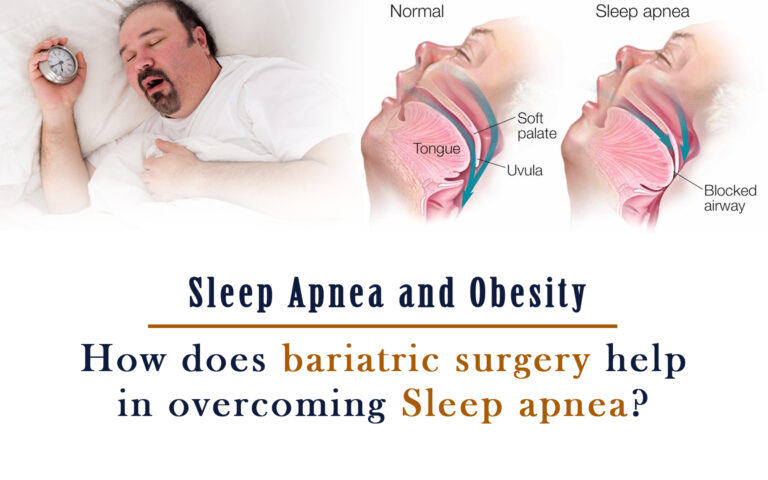How does bariatric surgery help in overcoming Sleep apnea?

Sleep apnea is a common disorder in which people experience disrupted breathing while sleeping. Obstructive sleep apnea (OSA), the most common type of sleep apnea occurs because of a narrow or blocked upper airway.
Several health conditions increase the likelihood of developing sleep apnea, but OSA is most common in people who are obese or overweight.
Excess weight leads to fat deposits in a person’s neck called the pharyngeal fat. Pharyngeal fat can block a person’s upper airway during sleep ,when the airway is already relaxed. This is why snoring is the most common symptom of sleep apnea where in the air is being squeezed through a restricted airway, causing a loud noise.
Additionally, increased abdominal girth from excess fat can compress a person’s chest wall , decreasing the lung volume. This reduced lung capacity diminishes the airflow making the upper airway collapse during sleep.
Sleep apnea risk increases with a rising Body mass Index (BMI) ,which measures one’s body fat based on height and weight.
The less common causes of sleep apnea include – enlarged tonsils that block the airway, anatomical features like large neck or narrow throat, endocrine disorders (including diabetes and thyroid), acid reflux, lung diseases and heart problems.
Many studies show that weight loss improves sleep apnea. If anyone is struggling with sleep apnea or excess weight, it is important to understand the complex interactions between the two conditions.
Treating sleep apnea like treating many diseases ,starts with lifestyle and behavioural modifications. This includes working towards a healthy body weight. Weight loss reduces the fatty deposits in the neck region and the tongue which contributes to the restricted airflow.
Weight loss results in reduced abdominal fat, which in turn increases lung volume and improves airway traction, making the airway less likely to collapse during sleep.
Losing weight can also reduce many OSA related symptoms such as daytime sleepiness and snoring. Along with improvement in cardiovascular health ,high blood pressure ,insulin resistance ,type 2 diabetes and quality of life.
OSA improvement is proportional to the amount of weight lost. Therefore patients should discuss with their doctor which weight loss strategy is best suited for them.
Some of the weight loss methods include:
- Dietary changes
- Increased physical activity
- Medications
- Surgery
Doctors or dietitians prescribe dietary and exercise interventions as a first line of treatment for obesity. But obese patients who are unlikely or unable to achieve adequate weight loss through other methods ,bariatric surgery is the best option for weight loss.
The prevalence of obesity has increased over the period of time. This has resulted in increased occurrences of obesity related disorders such as sleep apnea. The 3 most important factors to consider with sleep apnea are age group, sex, and weight. Sleep apnea occurs more frequently in men, older individuals and those with higher BMI.
The neck circumference, waist circumference and waist to hip ratio are also considerations when addressing obesity and suspecting sleep apnea.
The most common treatment for sleep apnea is the use of Continuous positive airway pressure (CPAP). Some patients find this option a burden for lifelong management of disorder. Others find the delivery of CPAP intolerable. In these patients weight loss is a viable strategy for reduction and progression of sleep apnea.
Weight loss has been found to reduce the severity of sleep apnea. By maintaining a healthy weight one can avoid sleep apnea and other obesity related disorders.
During an apnea episode ,the diaphragm and chest muscles work harder to open the closed airway and large changes in the blood pressure can occur as well. Breathing usually resumes with a loud gasp or body jerk. This decreases the sleep quality and reduces the flow of oxygen to the vital organs. Untreated sleep apnea is associated with an increased risk of hypertension, heart attacks and strokes.
Bariatric surgeries are considered as the proven procedures for treating and reducing the symptoms of sleep apnea. The most common bariatric surgery involves – Roux en Y gastric bypass, adjustable gastric banding and sleeve gastrectomy. Bariatric surgery is a minimally invasive method which uses advanced laparoscopic techniques.
Bariatric surgery is the most effective treatment of OSA. When patients lose weight following surgery, the fatty tissue around the upper airway is decreased which reduces or eliminates the upper airway collapse. You’ll be able to breathe easier and sleep better.
Aastha Bariatrics is a centre of excellence for bariatric and metabolic surgery. We at Aastha Bariatrics take immense care of the patients and also guide them throughout the bariatric surgery procedure. Dr. Manish Motwani is one of the best bariatric surgeons in India with 26 Years Experience Overall. No post surgery complications have been experienced by patients from the last 15 years. We have one of the best teams, who are highly specialised in weight loss and obesity. Our experts will work with you to determine what is best for you.
Read also; The Cost of Bariatric Surgery in India
Why We Are?
- Asia's Trusted Bariatric Center
- Centre of Excellence
- Patient Trusted Highly Volume Bariatric Center in Mumbai
- EMI, Cashless & Mediclaim Facilities are Available
- Daily Patients Follow-up after Bariatric Surgery
- Patient Support Group Every Month
- Obesity Awareness Program
- Available with Latest Technologies
- 18+ Experience in Weight Loss Bariatric Surgery
- 300+ Weight Loss Diet Plan & Recipes
- Highly Trained & Experienced Bariatric Nutritionist
- Patient WhatsApp Chat Group
- & Many More
Medically reviewed by Dr. Manish Motwani, Bariatric & Metabolic Laparoscopic Bariatric Surgeon — Curated by Vidhi Jain







